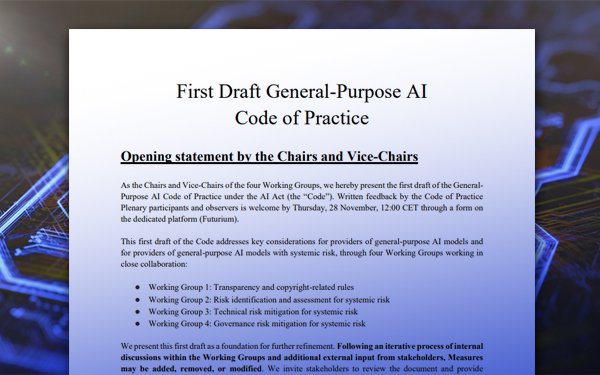
The
European Union has released the first draft of General-Purpose AI Code of Practice (GPAI).
The draft was developed
based on contributions from providers of general-purpose AI models, and considers international approaches.
The code, when complete, will apply to providers of
general-purpose AI models under the European Union’s AI Act.
advertisement
advertisement
Feedback is open until November 28, but the draft process will continue into 2025.
The draft code describes
AI applications and provided guidance for meeting the EU AI Act’s requirements. GPAI providers may choose to deviate from the best-practice suggestions if they believe they can demonstrate
compliance in other ways.
Markus Anderljung, director of policy and research at the Centre for the Governance of
AI, wrote on X that he participated as one of the vice chairs on the paper.
"We've got many more drafts to go until May 2025, I'd be keen on folks' input on how it can be
improved," Anderljung wrote. His research focuses on AI regulation, compute governance, and other topics, but there were many others.
The news comes at a time when OpenAI, Google, Microsoft,
Anthropic, Perplexity and many other AI-based technologies are on the verge of moving advertising to the next level of performance and measurement.
The EU's final document will play an
important role in guiding the future development and deployment of trustworthy and safe general-purpose AI models in a variety of industries, including advertising.
When complete, it will
detail transparency and copyright-related rules for providers of general-purpose AI models.
This could pose a challenge for a small number of providers of the most advanced models, the
document states.
The code will detail a list of risks such as risk assessment measures, as well as technical and governance mitigation measures.
The risks include offensive
cybersecurity risks such as discrimination, an inability to control the autonomous general-purpose AI and automated use of models for AI research and development, any manipulation like disinformation
and misinformation that could pose risks to democratic processes or lead to a loss of trust in media.
As part of the process, next week the chairs -- along with nearly 1,000 persons of
interest in the Code, EU Member States representatives, European and international observers -- will come together to discuss the draft in working-group meetings. Each day, one of the four working
groups will meet, and the respective Chairs will provide an update on the progress.
All participants will have the opportunity to voice their views and pose questions to Chairs. On November
22, the chairs will present key insights from the discussions to all.
In September, the EU announced the list of independent experts from the EU, the U.S. and Canada. They were tasked to
lead work on drafting the code that includes language models such as ChatGPT and Google Gemini.